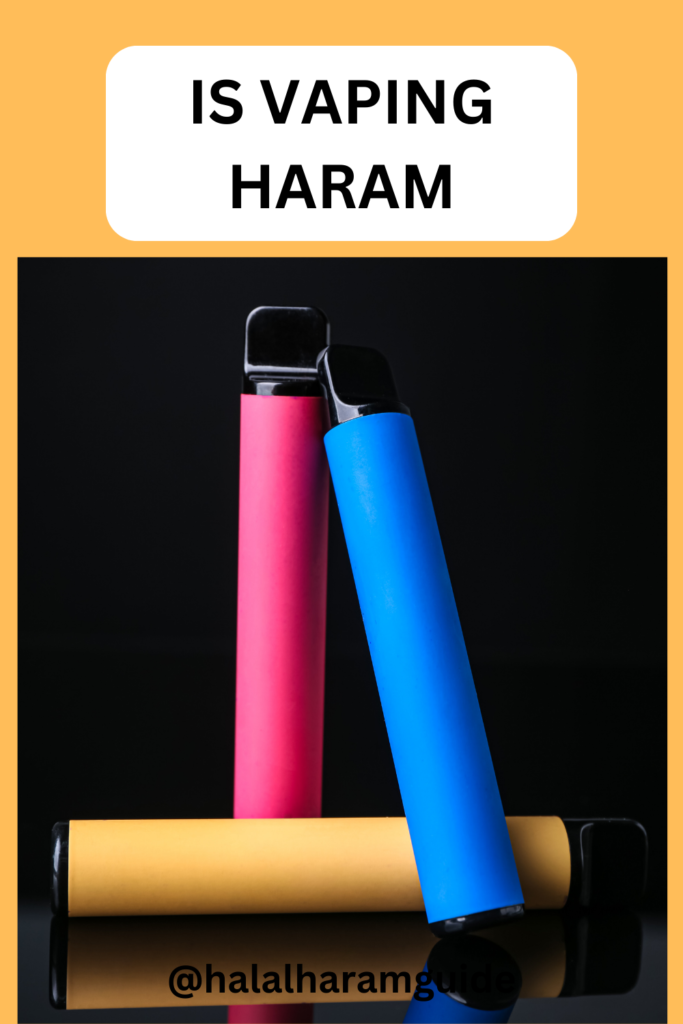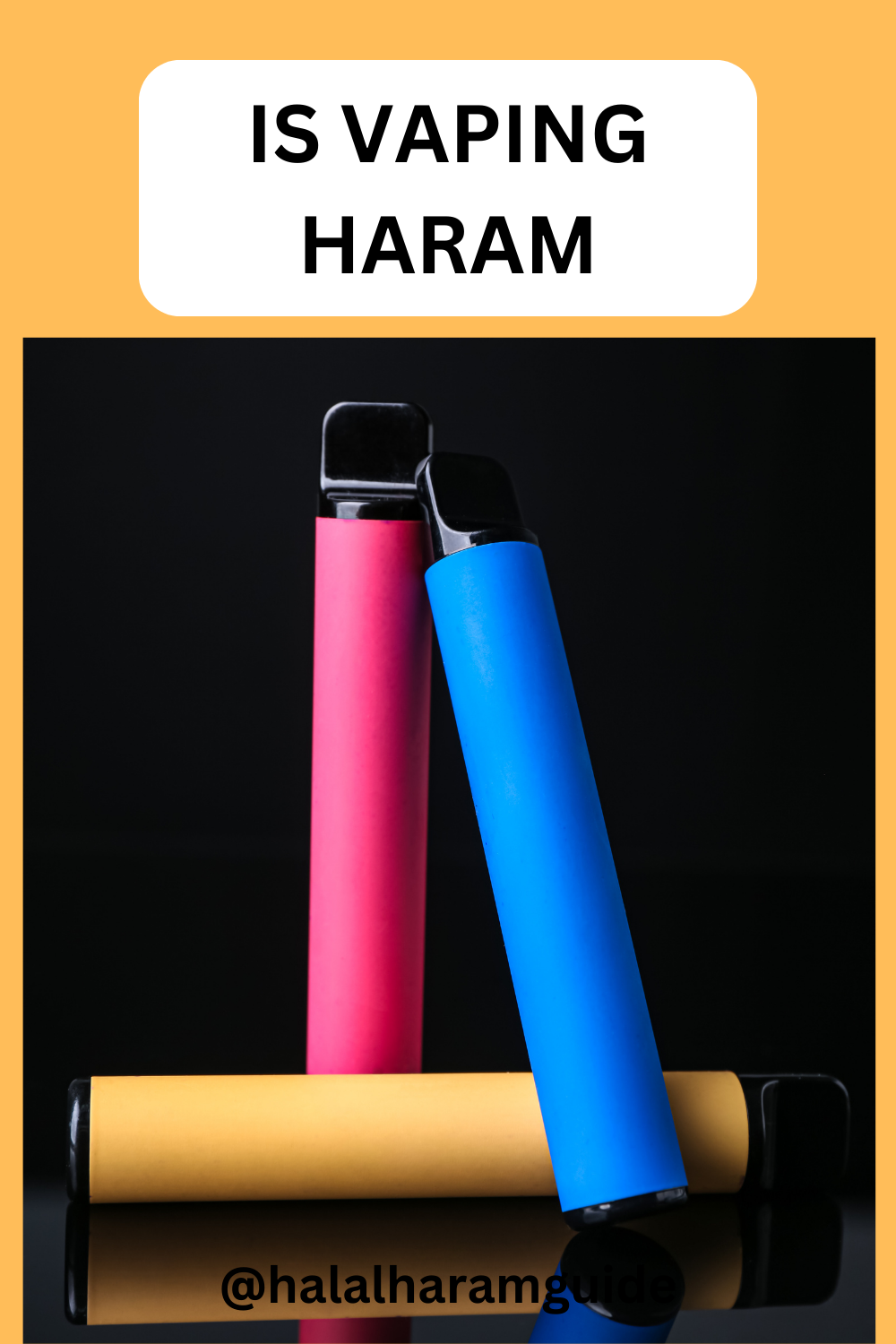Let’s talk about “Is Vaping Haram?”
In the realm of modern lifestyles, new trends and technologies constantly emerge, presenting both opportunities and challenges. One such trend that has captured significant attention is vaping, a practice that involves inhaling vaporized substances through electronic devices.
While vaping is often promoted as an alternative to traditional smoking, it has raised important questions in various communities, including among Muslims. In this exploration, we delve into the topic of “Is vaping Haram in Islam?”
We aim to shed light on the moral, ethical, and health considerations that revolve around this issue, providing clarity for those seeking to align their choices with Islamic principles and values.
Is Vaping Haram In Islam?
The permissibility of vaping in Islam can vary depending on individual interpretations and cultural contexts, as Islamic jurisprudence often takes into account the potential harm and impact on one’s health.
While traditional tobacco smoking is generally discouraged in Islam due to its harm to the body, the use of e-cigarettes or vaping may be viewed differently by some Islamic scholars and communities.
However, the exact stance on vaping can vary among different scholars and communities, and it’s advisable for individuals concerned about this matter to consult with a knowledgeable religious authority or scholar who can provide guidance based on their specific circumstances and understanding of Islamic principles.
Ultimately, the decision regarding the permissibility of vaping in Islam may depend on various factors, including individual health, intentions, and local interpretations of Islamic teachings.
What Type of Vape Is Haram?
The permissibility of vaping (using electronic cigarettes) in Islam is a subject of debate and can vary depending on individual interpretations and cultural contexts. However, there are certain aspects of vaping that might raise concerns in the context of Islamic ethics:
Harm to Health:
In Islam, the preservation of one’s health is considered a religious duty. If a particular type of vape or vaping product is known to be harmful to health or poses significant health risks, it could be considered Haram (forbidden). This is based on the principle that Muslims should not intentionally harm their bodies.
Addictive Substances:
If a vaping product contains addictive substances, such as nicotine, and its use leads to addiction, it could be viewed negatively in Islam. Anything that leads to addiction or hinders one’s ability to fulfill their religious obligations is generally discouraged.
Wastefulness:
Islam also encourages the responsible use of resources. If a person is excessively spending on vaping products to the detriment of their financial well-being or is wasting resources, it may be viewed unfavorably.
Is Selling Vape Haram?
The permissibility of selling vape products (electronic cigarettes) in Islam can be a subject of debate and may depend on various factors. Here are some considerations:
Addictive Substances: If the vape products being sold contain addictive substances like nicotine, and there is no consideration for the health consequences or addiction potential, it could be seen as contributing to harm and addiction, which might be discouraged in Islamic ethics.
Intention and Responsibility: Intentions matter in Islam. If a seller is aware of the potential harm and addictive nature of the products being sold but continues to sell them without concern for the well-being of customers, it could raise ethical questions.
Local Laws and Regulations: The permissibility of selling vape products might also depend on the legal regulations in a particular country or region. If local laws prohibit the sale of such products to minors or have other restrictions, a Muslim seller would generally be expected to abide by those laws.
What Hadith Explains Vaping As Haram?
The permissibility or prohibition of practices like vaping is typically determined based on the following Islamic principles:
Preservation of Health: Islam places great importance on the preservation of one’s health. Anything that is harmful or poses a significant risk to health can be discouraged or even considered Haram (forbidden). This principle is derived from various Hadiths and Quranic verses that emphasize the responsibility of caring for one’s body.
Avoiding Harm: The Islamic principle of “blocking harm” (sadd al-dhara’i) encourages Muslims to avoid practices that may lead to harm or sinful behavior. If vaping is seen as potentially leading to harm, such as addiction or negative health effects, it may be viewed negatively in light of this principle.
Avoiding Addiction: Islam discourages anything that leads to addiction or hinders a person’s ability to fulfill their religious obligations. If vaping products contain addictive substances like nicotine and lead to addiction, it could be viewed unfavorably.
Intention and Responsibility: Intentions matter in Islam. If a person is aware of the potential harm or negative consequences of vaping and continues to engage in it without due consideration, it may be seen as a disregard for personal responsibility and the well-being of others.
Is Cannabidiol (CBD) Vaping Haram?
The permissibility of using Cannabidiol (CBD) through vaping in Islam can be a topic of debate and may depend on various factors. CBD is a non-psychoactive compound derived from the cannabis plant, and it is often used for various therapeutic purposes. Whether CBD vaping is considered Haram (forbidden) or not can be influenced by several considerations:
Content and Intent: The source and content of the CBD product matter. If the CBD used for vaping is derived from the hemp variety of the cannabis plant and contains negligible or no THC (the psychoactive component), and the intention behind its use is for legitimate medical or therapeutic purposes, some scholars may view it as permissible.
Intention and Responsibility: Intentions matter in Islam. If the use of CBD through vaping is done with the intention of seeking relief from a medical condition and under the guidance of a healthcare professional, it may be viewed differently than recreational use.
Addictive Behavior: Islam discourages anything that leads to addiction or hinders a person’s ability to fulfill their religious obligations. If vaping CBD leads to addiction or affects one’s responsibilities, it may be seen unfavorably.
Is Vaping Haram During Ramadan?
During Ramadan, the holy month of fasting observed by Muslims, the permissibility of vaping, like other issues related to dietary and lifestyle choices, can be a subject of debate among Islamic scholars and communities. While there is no specific Hadith (sayings or actions of the Prophet Muhammad) that directly addresses vaping during Ramadan, several general principles should be considered.
Fasting as a Spiritual Act:
Ramadan is a month of spiritual reflection, increased devotion, and fasting from dawn until sunset. The act of fasting encompasses not only abstaining from food and drink but also refraining from behaviors that may negate the spiritual purpose of fasting. If vaping is seen as potentially affecting one’s focus on spiritual activities or as undermining the health benefits of fasting, it may be discouraged during Ramadan.
Preservation of Health:
Islam places a high value on the preservation of one’s health. If vaping is known to have negative health effects, it could be viewed unfavorably during Ramadan, as it goes against the principles of caring for one’s body, which is considered a trust from Allah.
Avoiding Harm and Addiction:
Anything that leads to harm or addiction is generally discouraged in Islam. If vaping has the potential to be addictive or to cause harm to one’s health, it may be viewed negatively during Ramadan.
Intention Matters:
Intentions play a significant role in Islamic ethics. If one’s intention for vaping during Ramadan is for legitimate medical purposes under the guidance of a healthcare professional, it might be viewed differently than recreational use.
Does Vaping Break Wudu?
The question of whether vaping breaks Wudu (ablution) in Islam can be a matter of debate among scholars. Wudu is the ritual purification Muslims perform before prayer and other acts of worship. Generally, Wudu is invalidated by certain actions, such as using the restroom, passing gas, and other activities that break its state of purity.
In the case of vaping, it is not explicitly mentioned in traditional Islamic jurisprudence, as the practice of vaping did not exist during the time of the Prophet Muhammad. However, scholars may consider the following factors:
Substance and Intention:
Some scholars argue that if the substance used in vaping contains impure or prohibited ingredients, or if the intention behind vaping is not for a legitimate reason, it may break Wudu. Impure substances and actions that compromise one’s spiritual state can invalidate Wudu.
Inhalation of Vapor:
Others argue that inhaling vapor, which is essentially water vapor mixed with flavorings and potentially nicotine, may not necessarily break Wudu, as it doesn’t involve the same impurities as other substances like alcohol or impure food.
Precautionary Measures:
Many scholars advise caution and recommend renewing Wudu after vaping to ensure the highest level of spiritual purity before performing acts of worship.
Conclusion
In conclusion, the question of whether vaping is considered Haram in Islam is a matter of ongoing debate and interpretation among Islamic scholars.
While some argue that it may be Haram due to potential harm to health and resemblance to prohibited acts, others contend that it falls into a gray area and may depend on individual circumstances.
Muslims are encouraged to seek guidance from knowledgeable religious authorities and consider the potential health risks associated with vaping when making informed decisions about its permissibility in their lives. Ultimately, prioritizing one’s well-being and adhering to Islamic principles of moderation and avoidance of harm should guide such choices.
Frequently Asked Questions
Is Vaping Haram In Islam?
The permissibility of vaping (using electronic cigarettes) in Islam can be a topic of debate among scholars and varies based on individual interpretations. Some scholars may view vaping as Haram (forbidden) due to concerns about its potential harm to health, addictive nature, and the fact that it often involves inhaling substances into the lungs. Others may allow it under certain conditions or if it is used for legitimate medical purposes. Ultimately, the permissibility of vaping can depend on the specific circumstances and the scholarly opinions one follows.
Can Muslims Smoke Or Vape?
The permissibility of smoking or vaping in Islam can depend on the content of the product, its potential harm, and the intention behind its use. Traditional tobacco smoking is often discouraged in Islam due to its known harm to health. When it comes to vaping, similar principles apply. If a product is harmful, addictive, or used recreationally without a legitimate reason, it may be discouraged or considered Haram. However, if it is used for a legitimate medical purpose and does not harm the individual, it might be viewed differently.
What Is Haram In Vaping?
What may be considered Haram in vaping includes:
Using vaping products that contain Haram (forbidden) substances, such as alcohol or prohibited flavorings.
Vaping with the intention of harming one’s health or becoming addicted.
Using vaping products in a way that interferes with fulfilling religious obligations or responsibilities.
Promoting or encouraging the use of vaping products to others, especially if it leads to harm or addiction.
Is Smoking Haram Or Makruh?
Smoking is generally discouraged and often considered Makruh (disliked) in Islam due to its harmful effects on health. While it may not be explicitly Haram (forbidden), the potential harm it causes to one’s body is a significant concern. Many Islamic scholars and authorities advise Muslims to avoid smoking due to its negative impact on health, which goes against the principles of preserving one’s well-being and the trust of one’s body, as taught in Islam. However, the exact stance on smoking may vary among scholars and individuals.
- “Is Lobster Halal? Understanding Its Permissibility”
- “Is Drawing Haram in Islam? Understanding the Perspective”
- “Is Fermented Kimchi Halal? Exploring Kimchi’s Halal Status”
- “Is Collagen Halal? Unveiling the Halal Status of Collagen”
- “Is Wine Vinegar Halal? Unveiling Its Permissibility”


